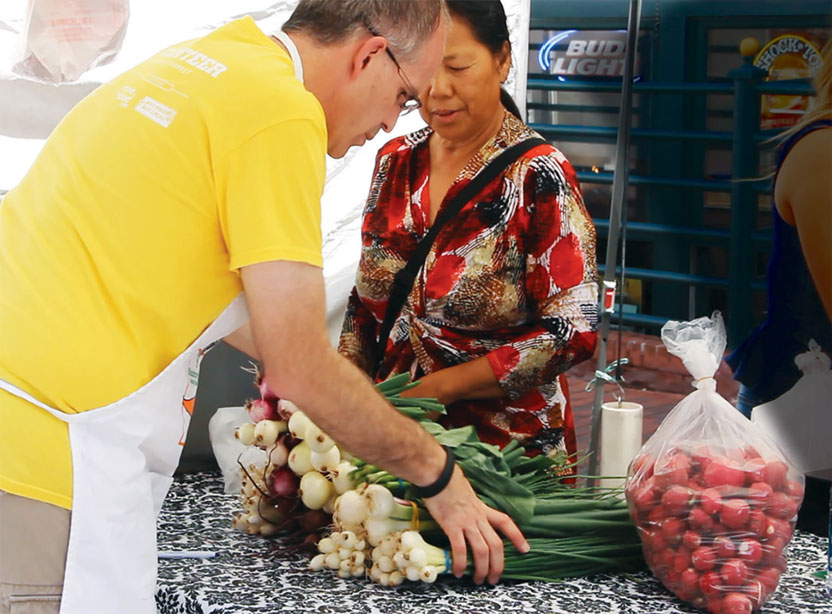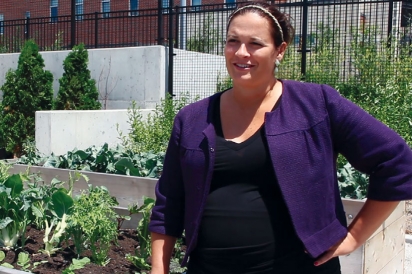Building Connections
Eat Greater Des Moines boosts local food efforts
Each year, Central Iowa Shelter & Services assists approximately 2,000 Des Moines-area adults, providing food and housing to homeless individuals and helping them move toward self-sufficiency. Ingredients for many of those meals come to the nonprofit via a thriving food rescue program. Restaurants, universities and stores donate goods that are perfectly edible but would otherwise go to waste: think day-old bread, blemished produce and surplus food from events.
Tom Vance, development coordinator for Central Iowa Shelter & Services, says the central Iowa nonprofit Eat Greater Des Moines (EGDM) connects his organization with donors who help the shelter extend its impact and budget through those contributions. Together, EGDM and more than 20 partner organizations support sustainable local food systems. And, by extension, these programs make healthy food more accessible to consumers and more profitable for producers.
“When Eat Greater Des Moines came to life, with the support of other community partners, it was a great opportunity to work with them on building program efficiencies,” says Vance.
While EGDM focuses on projects in Polk, Dallas and Marion Counties, it occasionally extends its efforts to surrounding communities, as well. Outreach ranges from programs addressing food access, hunger and nutrition to policy work and business development for new growers.
At Central Iowa Shelter & Services’ Mulberry Street campus in downtown Des Moines, individuals served by the nonprofit can take a six-week food prep training program that positions them for jobs in the community. Leaders are launching similar courses to teach growing and food production skills. This summer, volunteers helped build 15 raised beds, a 30-foot growing dome and a rainwater catchment system to support that effort.
Vance credits EGDM team members, including director Aubrey Alvarez, for their help in linking his group to community members interested in advancing the project.
“Aubrey has connected me with growers and producers and others interested in local foods. They have been really instrumental in shaping our ideas and getting feedback and funding,” he says.
Alvarez is one of two administrators who share one-and-a-half paid positions at Eat Greater Des Moines. She joined the nonprofit with experience in public administration and health promotion, and her colleague, Linda Gobberdiel, brings a background in nutrition and food systems. Together they manage EGDM in its current format, which has been funded by the Des Moines Area Religious Council and United Way of Central Iowa since late 2012. The precursor to Eat Greater Des Moines formed in 2009 and expanded with support from the Regional Food Systems Working Group, part of Iowa State University’s Leopold Center for Sustainable Agriculture.
As they outlined initial EGDM programming, Alvarez and Gobberdiel looked to the local food community.
“We had conversations with people involved in the food system at all different levels, from our school and community garden leaders to those growing food to sell to restaurants and grocery stores, and all the way through from when the seed is planted to food waste,” she explains. “We asked people what they think is going really well and what they’d like to see more of, as well as what things weren’t happening or weren’t happening as quickly as they’d like.”
That feedback helps EGDM fill gaps in the local food system. For example, the organization partnered with the Iowa Food Cooperative to host a “speed dating” event that debuted last fall. The gathering introduced regional growers to chefs interested in sourcing seasonal produce. Chefs found new inspiration and fresh sources of ingredients. At the same time, producers found new wholesale opportunities and gained a better understanding of what restaurants might buy from local farms.
“Sometimes, a challenge or barrier is just marketing your product. A lot of these producers are growing or raising quality products, but that’s a lot of work. So just going out and doing the marketing and building relationships with buyers, that’s the piece that is missing. We had the idea to just put them in a room and make them talk to each other,” says Alvarez, who has already been approached by other groups interested in hosting similar events.
EGDM also facilitates relationships between local food leaders and administrators at Lutheran Services in Iowa. Those connections create greater opportunities for vulnerable populations assisted by the statewide social services agency. Lutheran Services’ Global Greens program provides land access and business development assistance for Des Moines-area refugees interested in urban agriculture. Some participants join community garden programs so they can grow healthy food for their families and make new social contacts. Others sign on to cultivate produce sold at two Lutheran Services-organized farmers markets.
At the Global Greens training farm in West Des Moines, refugees sow seeds on plots as big as one quarter of an acre. They’re also invited to join crop production, business planning and marketing classes that help them establish their own commercial operations. Program supervisor Hilary Burbank works with EGDM to source seeds, supplies, donations and farmers market support.
“Eat Greater Des Moines is really a big support system for us, especially in terms of disseminating info and finding partners,” she says, calling the organization “the glue in the local food movement.”
“Instead of you being out there and having to know which partners you should connect with, Eat Greater Des Moines fosters that awareness and strengthens those connections,” says Burbank.
In addition to introducing producers to retailers, chefs and other supporters, EGDM links small-scale growers with open plots through a host garden program. The nonprofit promotes farmers markets and community-supported agriculture (CSA) operations and publicizes events related to local food and farming. Alvarez and Gobberdiel also help community members and organizations advocate for new opportunities in urban agriculture.
When West Des Moines residents wanted permission to update the city’s policies regarding backyard chickens, for instance, EGDM helped them research existing ordinances and successful approaches in other communities. Access to such information is especially important to beginner businesses and nonprofits, and members of the local food community are increasingly happy to share.
“We have a lot of garden groups doing great work, for example, whether those are school, church, community-based gardens,” says Alvarez. “We can glean those best practices and share them with other groups who maybe have run into roadblocks or are just getting started, so that they can be successful.”
Alvarez looks forward to a time when local foods will be the norm, rather than being viewed as specialty items. A consumer will buy vegetables at the grocery store, or order a steak at a restaurant, and know that the produce and proteins were raised just down the road. Shoppers’ dollars will support area growers and strengthen the regional economy. And, the terms and acronyms common to conversations about local food systems will be familiar to all.
“Ultimately, everyone eats. We’re all involved in the food system in some way or another,” says Alvarez. “Eat Greater Des Moines is just making it easier for people to support what they want to support with their dollars and their mouths.”
For more information on Eat Greater Des Moines, and its programs and partners, visit EatGreaterDesMoines.org or Facebook.com/EatGreaterDesMoines.






